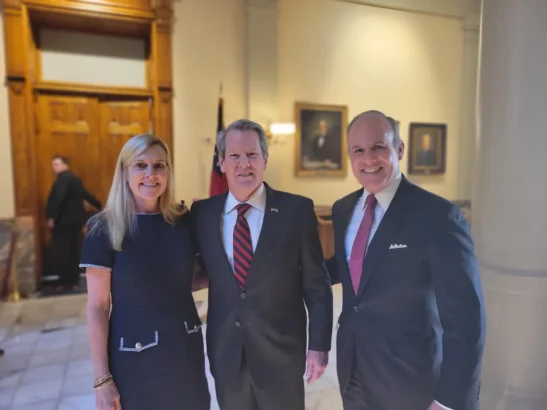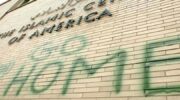Federal and state laws’ new definition of antisemitism includes subjective actions like holding Israel to a “double standard” not applied to other nations.
by Lee Fang, reposted from Lee Fang, May 2, 2024
The House of Representatives on Wednesday voted overwhelmingly to advance a bill that would empower the federal government to crack down on student protests by defining antisemitism in a way that includes certain criticism of Israel. Sponsored by Rep. Mike Lawler, a Republican from New York, the bill’s passage reflects a broader national trend.
Earlier this year, Gov. Brian Kemp signed H.B. 30, which revised Georgia’s hate crime statute to include certain forms of speech critical of Israel. In March, Gov. Kristi Noem signed legislation into the South Dakota civil rights statute that codified some forms of speech critical of Israel as a form of illegal discrimination. Nearly identical hate crime legislation passed the South Carolina legislature last week and now awaits signature by Gov. Henry McMaster.
Florida legislators are rapidly advancing a similar bill that provides enhanced criminal penalties, including extended prison time, for hate crimes involving some forms of speech related to Israel.
In New York, state legislators proposed legislation that would make it a Class A misdemeanor – punishable by up to a year in prison – to vandalize “any banner, poster, flyer, or billboard” that supports “the country or citizens of Israel in any way.”
The Lawler legislation differs from the state legislation in that it deals primarily with higher education. If the federal government finds that a university has allowed that definition of antisemitism to go unchecked, the U.S. government can deprive that university of federal funding — or even press charges for alleged civil rights violations.
By contrast, the state laws and legislation, including what is proposed in New York and enacted in Georgia, directly expand the scope of behavior subject to criminal prosecution and enhance sentences for existing violations. For example, an act of alleged anti-Israel vandalism would now be subject to a harsher penalty.
At the heart of it all is a desire to equate harsh Israel criticism and anti-Zionism — opposition to the idea of Israel as a “Jewish,” rather than secular, or multiethnic, or Arab state — with antisemitism.
All of these laws — federal and state — require government entities to adopt the International Holocaust Remembrance Alliance’s (IHRA) definition of antisemitism. The organization’s definition includes many sensible clauses whose prejudice no reasonable people would dispute, such as, “Calling for, aiding, or justifying the killing or harming of Jews in the name of a radical ideology or an extremist view of religion.”
But the IHRA definition of antisemitism also includes “denying the Jewish people their right to self-determination, e.g., by claiming that the existence of a State of Israel is a racist endeavor,” “drawing comparisons of contemporary Israeli policy to that of the Nazis,” and “applying double standards by requiring of [Israel] a behavior not expected or demanded of any other democratic nation.” Defenders of Israeli policy often use the latter, completely subjective metric to argue against undue attention on Israel’s policies in the United States, even though the U.S. is Israel’s primary financial and diplomatic backer.
In addition, the IHRA definition counts “the symbols and images associated with classic antisemitism (e.g., claims of Jews killing Jesus or blood libel) to characterize Israel or Israelis” as antisemitism. While it only lists “claims of Jews killing Jesus” in the context of the Israel debate, some conservative Christian voices who believe that Jewish contemporaries of Jesus played an integral role in his crucifixion have expressed fear that the IHRA definition could be used to restrict authentic expressions of the Christian faith.
Supporters of such legislation say these measures are needed amid a rise of anti-Jewish hatred and protests. However, critics contend that the legislation dangerously encroaches on First Amendment-protected speech, suggesting an unnecessary extension of policing powers over free expression. They point out that discrimination against Jews and acts of vandalism are already illegal.
Kenneth Stern, an antisemitism expert who helped develop the IHRA definition of antisemitism, has since criticized efforts to enshrine the definition into law.
“There was never any idea that this would be used as a de facto hate speech code on campus,” Stern told the Times of Israel. “You wanted to train police officials on it and so forth. But to curtail speech on a campus, in particular, is something that was never contemplated.”
A debate over the appropriate bounds of free speech has roiled the Republican party since Oct. 7, when the Palestinian militant group Hamas launched the deadliest terror attack against Israel in the country’s history. For years, conservative pundits and politicians had claimed the high ground on free speech, accusing the left of suppressing conservative voices and ideas in the media and on college campuses. Many of those same figures on the right are now pursuing the repression of anti-Israel speech with equal vigor.
Texas Gov. Greg Abbott, responding to concerns that conservative speakers faced barriers to political expression on college campuses, enacted a free speech law five years ago that compels public universities to ensure outdoor areas “are deemed traditional public forums” and encourages disciplinary policies for students and faculty who “unduly interfere” with others’ free expression.
“Some colleges are banning free speech on college campuses,” said Abbott in 2019. “Well, no more because I’m about to sign a law that protects free speech on college campuses in Texas.”
In recent days, however, Abbott, a strong supporter of Israel, instructed state police to disperse protest encampments against Israel’s military conduct in Gaza at several state universities. State troopers have made multiple arrests while aggressively clearing the encampment at the University of Texas, Austin. “These protesters belong in jail. Antisemitism will not be tolerated in Texas. Period,” the governor tweeted.
While the Lawler bill passed by a 320-91 bipartisan vote, pockets of resistance existed in both parties.
Rep. Matt Gaetz, R-Fla., called the Lawler legislation a “ridiculous hate speech bill” that would empower a new Department of Education speech police. Rep. Marjorie Taylor Greene, R-Ga., said the bill “could convict Christians of antisemitism for believing the Gospel that says Jesus was handed over to Herod to be crucified by the Jews.” Former Rep. Justin Amash, R-Mich., tweeted that the bill is “flagrantly unconstitutional under the First Amendment.”
Rep. Jerry Nadler, D-N.Y., a Jewish lawmaker who represents a district that includes the Columbia University campus, said the bill “threatens to chill constitutionally protected speech.”
“If this legislation were to become law,” Nadler added, universities wanting to avoid federal investigations or lose federal funding “could end up suppressing protected speech criticizing Israel or supporting Palestinians.”
The congressional legislation will “chill core political speech about the Israel/Palestine conflict on our nation’s campuses — the places where difficult conversations and debates are supposed to flourish,” noted the Foundation for Individual Rights and Expression.
The Lawler bill is now headed to the Senate, where Republican senators Tim Scott of South Carolina and Katie Britt of Alabama are sponsoring a companion bill.
Several pro-Israel groups support the legislation. Among the most prominent is the Israeli-American Coalition for Action, a sister organization of the Israeli-American Council. Lobbying disclosures show that the organization has pushed for the Lawler legislation since at least 2018, and the group celebrated its passage in a message sent to supporters yesterday.
Gov. Kemp stood side-by-side with Israeli-American Council chief executive Elan Carr at the signing ceremony for H.B. 30, which was attended by several other IAC lobbyists. Records show that IAC lobbyists also helped guide the South Dakota legislation.
Lee Fang: “I have interviewed billionaires and presidential candidates, investigated surveillance and toxic chemicals, and exposed corruption on the local and national levels. The focus of my work has fueled congressional hearings and upended elections. And my work uncovering illegal foreign influence in our campaign finance system led to one of the largest Federal Election Commission fines in American history.”
Read his full biography.
RELATED:
- Israel lobbyists write the laws that state legislators then pass
- Landmark bill restricting criticism of Israel sneaks through South Carolina Senate
- A wave of new post-Oct 7th “antisemitism” bills completely miss the point
- The ‘Antisemitism’ Moral Panic Has Officially Jumped The Shark
- International campaign is criminalizing criticism of Israel as ‘antisemitism’
- AIPAC Israeli Economic Espionage Against U.S. Hits $366 Billion
- US poised to give Israel $18 billion in aid this year





